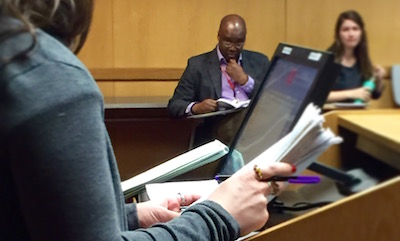In the Classroom: Students Get Practice with Press.

At a press conference about a case of Ebola in Dallas, a hard-hitting reporter raises her hand. Why, she demands of the two infectious disease epidemiologists at the podium, aren’t you doing more to eliminate the disease in West Africa?
One of the epidemiologists explains their main concern: controlling this case of Ebola in the US “so it doesn’t blow up to the same proportions as it has there.”
Michael Saunders, the communications multimedia director at the School of Public Health, lets out a long whistle. The class breaks out laughing. “Take two!” says Natasha Hochberg, assistant professor of epidemiology.
The two students playing epidemiologists respond to their fellow student—the “reporter”—again, this time without suggesting the possibility of a catastrophic Ebola outbreak in the US.
This is EP800: Microbes and Methods: Selected Topics in Outbreak Investigation, co-taught by Hochberg and Associate Professor of Biostatistics Laura White. On this particular day, the students are practicing a vital—but rarely taught—part of public health work: talking to the press and public.
In three scenarios based on real-world outbreaks, students are posing as reporters, concerned community members, and public health officials, with Saunders and Hochberg helping the latter craft clear, calm answers and explanations.
“Our whole approach to the class was to try to give students an integrated way to approach outbreaks,” Hochberg says. The class addresses key infectious diseases seen in outbreaks, how to approach investigations, how to analyze outbreak data, testing environmental sources, and other facets of outbreak investigation.
“Communicating with the media,” Hochberg says, “is a critical portion of dealing with outbreaks.”
By the third scenario—several visitors to Yosemite contracted Hantavirus, which is carried by mice—the students are becoming pros. They “pivot” questions away from panic and keep clear and calm, even when the questions get strange:
“I heard if you mix vinegar and human urine, and spray it all over the mouse droppings, it will kill the Hantavirus?”
Straight-faced, the students at the podium gently respond. Afterward, Saunders tells them they did a good job being respectful. “’That’s not a solution I’m aware of…’ Shutting down these wacky ideas drives the conspiracy theorists, of which there are many, into overdrive.”
The students laugh—and nod knowingly.
“It’s a good reality-check and learning experience,” student Rachelann Tripp says after class. “There’s no backspace,” she adds, no way to take back a slip of the tongue.
Student Nour Baghdady agrees. The day’s exercise gave her ideas on “how to think about [communications], how to prepare for it, what to anticipate. I think it was really helpful.”